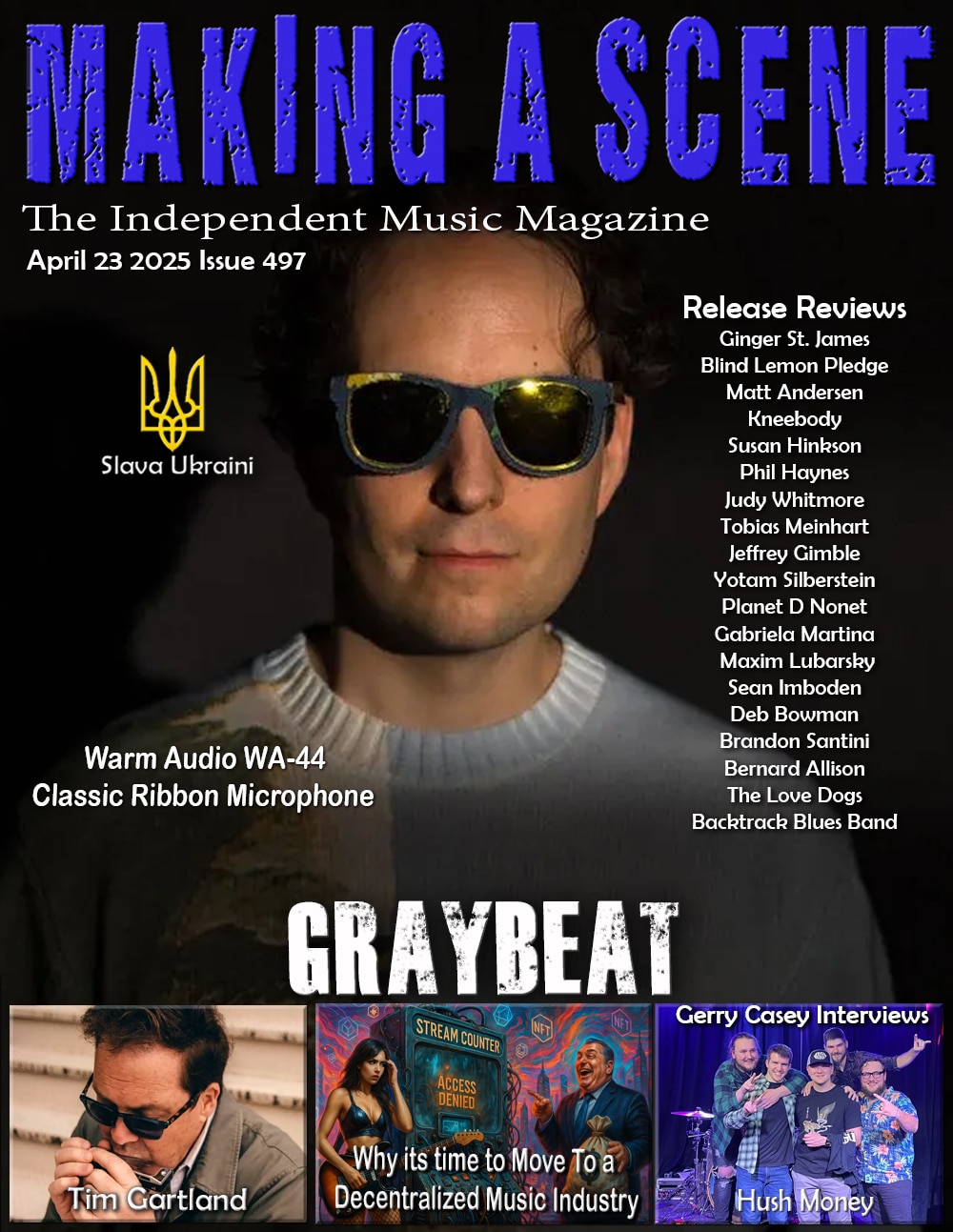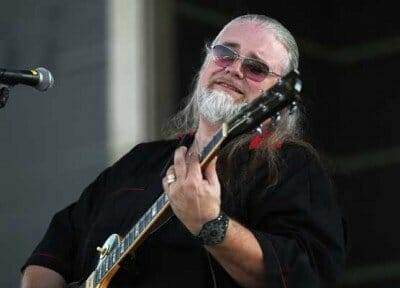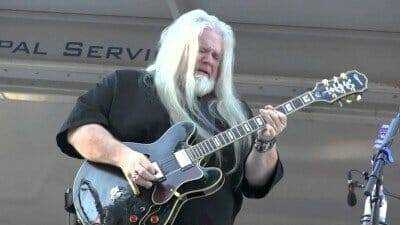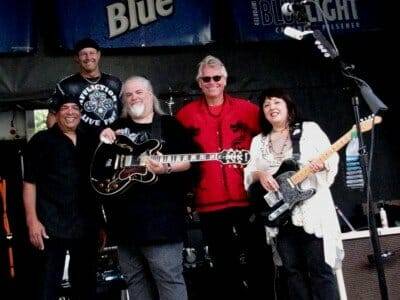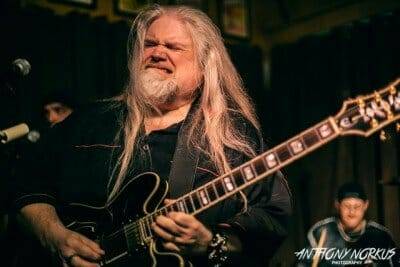An Exclusive Interview with Rusty Wright
AN Exclusive Interview with Rusty Wright! by Richard Lhommedieu on Mixcloud
“Mix together equal helpings of top-notch musicianship, vintage blues passion, Southern rock verve, blue-collar sentiment and a joyous stage attitude, and you’ve got the Rusty Wright Band. Over the past decade, Michigan hasn’t produced a more compelling rock-infused blues outfit.”
– John Sinkevics, LocalSpins.com
For guitarist and singer Rusty Wright, it’s “all about the moment,” commanding the stage to deliver the musical heat, the infectious grooves and the penetratingly sincere songs that have earned the Michigan musician a burgeoning national audience and recognition as a Master Blues Artist in the International Blues Hall of Fame.
Those who’ve seen Wright and his top-drawer band – wife and singer-guitarist Laurie Wright,drummer Marc Friedman and bassist Dennis Bellinger (Grand Funk Railroad) – perform live will attest to the outfit’s razor-tight, explosive delivery of inventive blues songs with tasty helpings of Southern rock and Detroit-bred grit.
It’s that rare combination (along with Wright’s trademark, flowing white hair and eye-popping guitar leads) that commands immediate attention, fills dance floors and earns roars of approval.
“Art gives life its real color and it’s that joy that makes it more than just a day-to-day drudge,” the guitarist says of creating music that audiences embrace.
“I try to be socially relevant. I’m just trying to do what I feel old bluesmen who spoke about their experience did at that time. They weren’t afraid to talk about things that may have made people’s eyebrows raise. You should never be afraid of writing a song that might make people think. Music is about making people engage. You might take some heat for it, but as long as you’re being honest, there will always be people who will get it.”
It’s that fearless approach to music that’s cultivated growing legions of loyal fans and driven Wright since he first started sneaking out of the house at night with his cousin on summertime visits to Alabama. The pair explored the wonders of live music, from country to early rock ’n’ roll to “the long-hair” stuff of the Allman Brothers, Lynyrd Skynyrd and the Marshall Tucker Band.
Reared in a fertile musical environment that included spinning his auto plant worker dad’s vast collection of vintage blues records and playing guitar in his gospel-singing mother’s touring group starting at age 13, Wright knew from the get-go what he was born to do.
“I hear music all the time. My head, my soul is filled with it. I can’t imagine not creating and making music,” says Wright, who started writing music, assembling bands and playing the club circuit in Flint and the Detroit area as a teenager.
“I loved the blues stuff from childhood because there was such emotion behind it. You listen to some of that Muddy Waters or John Lee Hooker or Howlin’ Wolf, and there’s just some incredible emotion flowing out of it. You could just feel it like you were there.”
That same sort of passion propels Wright’s music and live performances. It’s what’s driven him to spend thousands of hours, he says, “learning my craft, cutting my fingers, cramping my hands, and failing and going back and working even harder. There’s a huge emotional investment in becoming a musician.”
His wife, Laurie, an accomplished guitarist and singer in her own right, has witnessed Wright’s devotion to perfecting that musical approach since the couple met in the early 1990s. And she gets to watch the fruits of that labor on stage almost every night.
“He’s a monster of a player. It’s fun to watch the reaction of the youngbloods who don’t often get to see that kind of musicianship up close,” she offers, noting Wright also “stands out in any crowd. He cuts an imposing figure, and when you add that mane of white hair hanging past his belt these days, he looks like a wizard wielding a guitar.”
Since 2004, that wizard has spearheaded release of three widely praised studio albums and 2011’s “Live Fire,” shared stages with Lynyrd Skynyrd, Kenny Wayne Shepherd, Etta James, Johnny Winter, Ronnie Baker Brooks, Bettye Lavette, Walter Trout and many more, toured the world from Italy to South Korea, and more than once represented the Detroit Blues Society at the International Blues Challenge.
The band’s 2013 album, 2013’s “This, That & The Other Thing,” earned widespread radio airplay across North America and won Blues 411’s Jimi Award for Contemporary Blues Album of the Year. But that’s only the beginning: Wright vows that the band’s May 2015 release, “Wonder Man,” is “the pinnacle” of what he’s striving to deliver as a songwriter and musician. And that means casting an innovative, wide net musically to reflect his eclectic tastes.
“I have so many influences, I don’t just fit in one little space. I do bluesy stuff, but I’m not afraid to experiment,” he insists. “I’m trying to find a way to take the blues farther down the road that will appeal to a younger generation as well. I’m not afraid to bring in other styles of music. But I want it to have passion. You never want to lose the passion and the joy of that music and what it’s trying to express.”
That approach sets the Rusty Wright Band apart from the pack, with its music seamlessly assimilating everything from early prog-rock to “the intricate melodies and harmonies and counter-rhythms” of the Allman Brothers to the “cool riffs” and “right-in-the-pocket” grooves of Chicago blues guitarist Hubert Sumlin to the “big heavy bass beats” of electronic music.
It’s all blended with the forthright, honest nature of Wright’s plight-of-the-common-man lyrics, partly the product of growing up in an auto industry town that’s seen its ups and downs. The idea, says Rusty, is to craft “great grooves that are really strong and fun to listen to and that people can dance to” in songs that also “express some ideas.”
As a result, Laurie offers, the music even appeals to people “who think they don’t like blues.”
One thing’s for certain: The band appeals to those seeking the spectacle of a great show combined with soaring vocals and the power of versatile, polished players.
“We don’t depend on gimmicks or props to stand out. We’re definitely more about the music than the eye candy,” Laurie suggests. “We have a good time on stage. There is no acting cool or stand-offish. There is no barrier between us and the audience. We are there for them and for the energy that is exchanged when that connection is made.”
As Rusty puts it: “I can’t abide a shoe-gazer. I’m really big on having things tight and smooth so we can enjoy ourselves and smile at the crowd. People are there to be entertained and playing well is only half of it. You have to entertain.”
And as audiences across the globe are discovering, Wright and his band do that in fearless fashion.
Discover more from Making A Scene!
Subscribe to get the latest posts sent to your email.





































